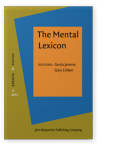Vol. 6:3 (2011) ► pp.374–392
The lifespan of lexical traces for novel morphologically complex words
This study investigates the lifespans of lexical traces for novel morphologically complex words. In two visual lexical decision experiments, a neologism was either primed by itself or by its stem. The target occurred 40 trials after the prime (Experiments 1 & 2), after a 12 hour delay (Experiment 1), or after a one week delay (Experiment 2). Participants recognized neologisms more quickly if they had seen them before in the experiment. These results show that memory traces for novel morphologically complex words already come into existence after a very first exposure and that they last for at least a week. We did not find evidence for a role of sleep in the formation of memory traces. Interestingly, Base Frequency appeared to play a role in the processing of the neologisms also when they were presented a second time and had their own memory traces.
Cited by
Cited by 5 other publications
This list is based on CrossRef data as of 6 june 2024. Please note that it may not be complete. Sources presented here have been supplied by the respective publishers. Any errors therein should be reported to them.
